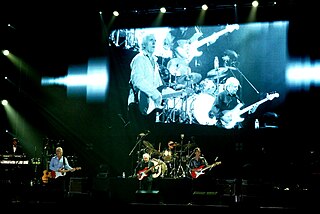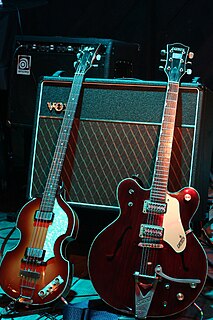This article needs additional citations for verification .(November 2019) (Learn how and when to remove this template message) |
Binson (Milan - Italy) was an early manufacturer of echo machines. Unlike most other analog echo machines, they used an analog magnetic drum recorder instead of a tape loop. Their most famous product was the Binson Echorec.

In music, tape loops are loops of magnetic tape used to create repetitive, rhythmic musical patterns or dense layers of sound when played on a tape recorder. Originating in the 1940s with the work of Pierre Schaeffer, they were used among contemporary composers of 1950s and 1960s, such as Steve Reich, Terry Riley, and Karlheinz Stockhausen, who used them to create phase patterns, rhythms, textures, and timbres. Popular music authors of 1960s and 1970s, particularly in psychedelic, progressive and ambient genres, used tape loops to accompany their music with innovative sound effects. In the 1980s, analog audio and tape loops with it gave way to digital audio and application of computers to generate and process sound.
Contents
After using Meazzi Echomatic machines successfully to establish his signature sound, Hank Marvin of The Shadows began using Binson echoes. He used various Binson units on record and stage for much of the mid-to-late 1960s, in conjunction with Vox AC30 amplifiers and Burns London guitars. Marvin continued to use Binsons until c.1979/1980, when he began using the Roland RE-201 echo.

Hank Brian Marvin is an English multi-instrumentalist, vocalist and songwriter. He is best known as the lead guitarist for the Shadows, a group which primarily performed instrumentals and was the backing band for Cliff Richard, and subsequently for Marvin, Welch & Farrar.

The Shadows were an English instrumental rock group. They were Cliff Richard's backing band from 1958 to 1968 and on numerous reunion tours. The Shadows have placed 69 UK charted singles from the 1950s to the 2000s, 35 credited to the Shadows and 34 to Cliff Richard and the Shadows. The group, who were in the forefront of the UK beat-group boom, were the first backing band to emerge as stars. As pioneers of the four-member instrumental format, the band consisted of lead guitar, rhythm guitar, bass guitar and drums. Their range covers pop, rock, surf rock and ballads with a jazz influence.

The Vox AC30 is a guitar amplifier manufactured by Vox. It was introduced in 1958 to meet the growing demand for louder amplifiers. Characterised by its "jangly" high-end sound it has become widely recognized by British musicians and others.
Binson units were used to great effect by Pink Floyd's original frontman Syd Barrett and then guitarist David Gilmour, but also by keyboardist Richard Wright. The classic Binson delay effect can be heard on songs such as "Interstellar Overdrive", "Astronomy Domine", "Shine On You Crazy Diamond" and "Time". [1] Jimmy Page of Led Zeppelin also used a Binson echo unit which was used on the drums in "When the Levee Breaks." Binson echo units were also used by Hawkwind, and more recently by Tarantula Hawk. Jon Courtney of British nu-prog band Pure Reason Revolution is also a frequent user of the Binson units. Another prevalent use of the Tape Delay was in the Goth Rock staple Bela Lugosi's Dead by Bauhaus.

Pink Floyd were an English rock band formed in London in 1965. Gaining a following as a psychedelic band, they were distinguished for their extended compositions, sonic experimentation, philosophical lyrics and elaborate live shows, and became a leading band of the progressive rock genre. They are one of the most commercially successful and influential groups in popular music history.

Roger Keith "Syd" Barrett was an English singer, songwriter, and musician who co-founded the rock band Pink Floyd in 1965. Characterised for his English-accented singing and free-form writing style, Barrett named the group and was their original lead singer, guitarist and principal songwriter. His innovative use of guitar techniques, such as dissonance, distortion and feedback, proved influential to many musicians.

David Jon Gilmour is an English guitarist, singer and songwriter who was a member of the progressive rock band Pink Floyd. He joined the group as guitarist and co-lead vocalist in 1968 shortly before the departure of founding member Syd Barrett. Pink Floyd achieved international success with the concept albums The Dark Side of the Moon, Wish You Were Here, Animals, and The Wall. By the early 1980s, they had become one of the best-selling and most acclaimed acts in music history; by 2012, the band had sold more than 250 million records worldwide, including 75 million units sold in the United States. Following the departure of Roger Waters in 1985, Gilmour assumed leadership of Pink Floyd, and released three more studio albums.
In Pink Floyd's 23-minute-long song "Echoes", Roger Waters used a Binson Echorec to create the eerie underwater wind noise heard during the first interlude (10:40-15:02 on studio recordings, underneath the screaming whale (?) song produced by Gilmour); he vibrated the strings of his bass guitar with a steel slide and fed the sound through the Echorec. Waters reproduced this sound during live performances. "One of These Days", a song written in the same period as "Echoes", features the effect prominently on the bass part that plays throughout the song. The Binson Echorec was a major part of the early Pink Floyd sound, until they started to use the VCS3 synthesizer in 1972. [2] Pink Floyd's Binson Echorec Baby was displayed at the Victoria and Albert Museum as part of the 2017 Their Mortal Remains exhibition. [3]
"Echoes" is a song by English rock band Pink Floyd, and the sixth and final track from their 1971 album Meddle. It was written in 1970 by all four members of the group. Containing several extended instrumental passages, largely ambient sound effects, and musical improvisation, the track has a running time of 23:31 and comprises the entire second side of the vinyl and cassette recordings.

George Roger Waters is an English songwriter, singer, bassist, and composer. In 1965, he co-founded the progressive rock band Pink Floyd. Waters initially served solely as the bassist, but following the departure of singer-songwriter Syd Barrett in 1968, he also became their lyricist, co-lead vocalist, and conceptual leader.

"One of These Days" is the opening track from Pink Floyd's 1971 album Meddle. The composition is instrumental except for the only spoken line from drummer Nick Mason, "One of these days I'm going to cut you into little pieces." It features double-tracked bass guitars played by David Gilmour and Roger Waters, with each bass hard panned into one channel of stereo, but one bass sound is quite muted and dull. According to Gilmour, this is because that particular instrument had old strings on it, and the roadie they had sent to get new strings for it wandered off to see his girlfriend instead.









